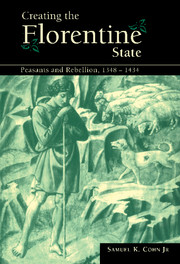Book contents
- Frontmatter
- Contents
- List of illustrations
- List of tables
- Acknowledgements
- Note on citations, dates, and measures
- Introduction
- PART I CULTURE, DEMOGRAPHY, AND FISCALITY
- PART II PEASANT PROTEST IN THE MOUNTAINS: THREE VIEWS
- 4 Peasant insurrection in the mountains: the chroniclers' view
- 5 Peasant insurrection in the mountains as seen in the criminal records
- 6 Rebellion as seen from the provvisioni
- PART III GOVERNMENTAL CLEMENCY AND THE HINTERLAND
- Conclusion
- Appendix 1 Regression models: wealth, migration, and taxes
- Appendix 2 Tax coefficients, 1354–1423
- Bibliography
- Index
4 - Peasant insurrection in the mountains: the chroniclers' view
Published online by Cambridge University Press: 07 August 2009
- Frontmatter
- Contents
- List of illustrations
- List of tables
- Acknowledgements
- Note on citations, dates, and measures
- Introduction
- PART I CULTURE, DEMOGRAPHY, AND FISCALITY
- PART II PEASANT PROTEST IN THE MOUNTAINS: THREE VIEWS
- 4 Peasant insurrection in the mountains: the chroniclers' view
- 5 Peasant insurrection in the mountains as seen in the criminal records
- 6 Rebellion as seen from the provvisioni
- PART III GOVERNMENTAL CLEMENCY AND THE HINTERLAND
- Conclusion
- Appendix 1 Regression models: wealth, migration, and taxes
- Appendix 2 Tax coefficients, 1354–1423
- Bibliography
- Index
Summary
As the previous chapters have shown, trends in household wealth, the differential in wealth between plains and mountains, rates and direction of migration, and changes in tax rates point to the end of 1401 or 1402 as a fundamental turning-point in the long-term history of Florence's domination over its hinterland. This is not the first time in recent Florentine historiography that the same date has been signaled as a turning-point in Florentine history. Following the propagandistic histories of Goro Dati and Leonardo Bruni, Hans Baron described Florence's war with Milan as the last stance of “liberty” against the rising sea of Milanese “tyranny.” From this crisis in the summer of 1402, a new intellectual movement was born – civic humanism – which ultimately gave the Italian Renaissance its distinctive character and through the writings of Machiavelli would cross the Alps as the intellectual basis of seventeenth-century republican consciousness. But other than the key date of 1402, my theses and Baron's have little in common. Indeed, our notions of what were the underlying causes of change may even be contradictory. As Baron boldly announced in his introduction, the originality of his work was explaining ideas within the context of politics. Yet, while he reacted against a simple “history of ideas,” he was even more hostile to explaining ideas in the context of economic and social forces.
- Type
- Chapter
- Information
- Creating the Florentine StatePeasants and Rebellion, 1348–1434, pp. 113 - 137Publisher: Cambridge University PressPrint publication year: 1999



